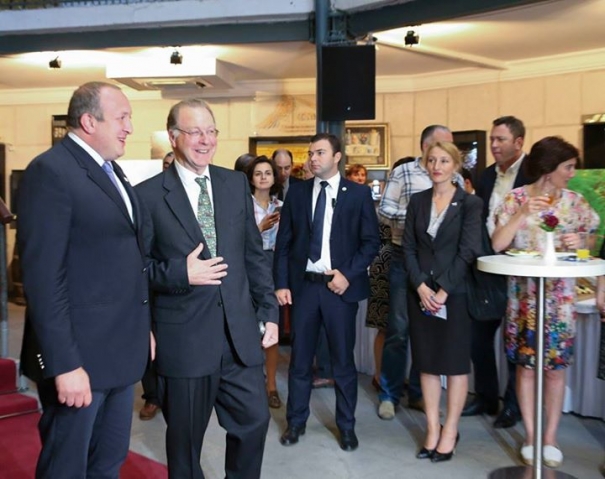Five Years of the Caucasus Nature Fund in Georgia
We need nature more than nature needs us. And this is especially true in regions with a biodiversity as rich as the Caucasus’.
Aware of the region’s biologic uniqueness, the Caucasus Nature Fund supports Georgia’s protected areas, emphasizing long-term commitment, transparency and accountability. This week it celebrated its 5th anniversary of work in the country with a reception attended by the President of Georgia, Giorgi Margvelashvili, and the Minister of Environment, Teimuraz Murgulia, among other personalities.
The event came as a celebration of what has already been achieved: 2.7 million Euros in support of the protected areas of Armenia, Azerbaijan and Georgia, a funding that has provided a living wage for over 500 park rangers and staff, small infrastructure and trail maintenance projects, and essential equipment such as binoculars, saddles for horses, as well as fire trucks and patrol jeeps.
And it also came as a promise of what is coming: CNF aims to support 20 parks by 2020, safeguarding over 1 million hectares. In order to smooth the process, some changes may be necessary: “The problem with Georgia is that it is too centralized,” David Morrison, Executive Director of the CNF, told Georgia Today in an exclusive interview. “This has been good in many ways, like, for example, in helping combat corruption. But it is now stopping optimal development. We need the protected areas to have more financial independence, we need more flexibility in the process of funding projects, like if a park needs 500 lari for a particular project they should be able to get the money immediately and not have to wait until it is approved in Tbilisi.”
Natia Kobakhidze, Chairperson of the Agency of Protected Areas, agreed with Morrison that Georgia’s centralized system is indeed a problem. She put this into context adding that “to change the current situation new legislative acts should be developed, new jobs would need to be created and some positions destroyed. This can be done but it is a difficult and long process”.
Kobakhidze added that Georgia’s protected areas also face a problem of brain drain: “The jobs at the Protected Areas are difficult and the salary is still low. Once trained, many leave for better-paid positions at the WWF or the CNF”. She also pointed out that Protected Areas should operate as a network and not be isolated, because this limits their potential. “We also should take care of the corridors between these areas”.
Another important challenge is, according to Kobakhidze, the economic interests that could potentially come before protecting biodiversity, such as hydroelectric power plants. She recognized the important role of the funding provided by the CNF to Georgia. CNF works through public-private partnerships with the three governments of the South Caucasus, each side committing to long-term support for the Protected Areas. Following a 50% principle, CNF matches but does not exceed State budgets – potentially doubling a specific park’s operating funds. “From the late 90’s, the World Bank established infrastructure in the country, but we did not have funds for the maintenance costs that are now being covered by the CNF”.
Despite the challenges ahead, Georgia is considered an example to follow because of the speed at which the Protected Areas are being effectively developed. The CNF also carries out its activities in Armenia and Azerbaijan, and according to Morrison, “each country brings its own challenges: Azerbaijan, for example, is very protective of its areas and not open enough to tourists. Armenia has the opposite problem to Georgia: it is too decentralized, and this has a cost in terms of efficiency.”
Despite the differences among the three neighbouring countries, there are important common points as to how the CNF operates. Having the expenses audited by an international audit firm and also having local NGOs specialized in nature overseeing the projects is one of these common ways. This ensures that donors know that every penny given to the Caucasus Nature Fund is properly spent. This investment is not only a guarantee of preserving the richest biodiversity of any temperate climate zone in the world, but an investment for future economic development in the region.
In his keynote speech at the event, Morrison heavily stressed the importance of ecotourism, involving local communities in the process and benefiting financially from it. He quoted the example of Costa Rica, one of the pioneers in the field. According to Sujata Narayan, expert on the topic from the University of Michigan, “there, ecotourism has created opportunities for income generation and employment, at both the national and local levels.” In an article about the Costa Rica case, Narayan stressed that as a result of this expansion “local communities and schools have received significant amounts of investment and donations from visitors.”
But the eco-regional approach used by the CNF could have an impact beyond nature and economy: given that some Protected Areas are located along national boundaries, cooperation for the purpose of preserving their shared natural environment may contribute to reducing the potential for conflict. Indeed, the CNF is partner of the the Transboundary Joint Secretariat (TJS), an organization providing support to the Ministries of Environment of Armenia, Azerbaijan and Georgia to increase regional harmonization.
So for economic, preservation and peacebuilding reasons, as David Morrison put it at the CNF event on Wednesday, we need nature more than nature needs us.
Maria Jose Riquelme del Valle












